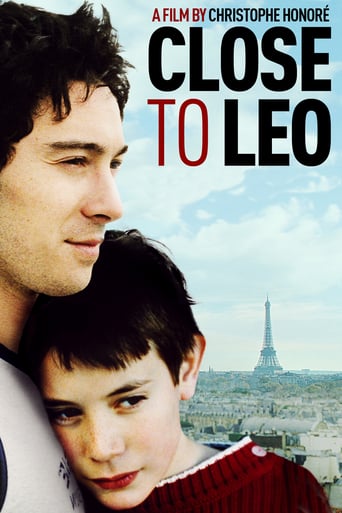tages-1
In the first few minutes the theme of the movie is set. Leo announces that he is HIV+ while the youngest brother, Marcel (12 yrs), has been sent upstairs to change. Marcel returns quickly enough to overhear the bad news, or at least quickly enough to know that he missed something important. Marcel approaches the table and gets two slow affectionate kisses from everyone at the table, and then goes upstairs and cries in the tub. So the family knew the news would be difficult, and are too cowardly to deal with the youngest boy's expected anguish. Marcel is too cowardly to reveal what he knows, and stays silent.In two scenes Marcel and mother have awkward conversations, with both too scared to speak the truth.Marcel's dirty joke reveals much about the contempt the family has for confidence.Leo cowardly approach to his lover, Marcel's friend's mother, one brother not wanting to reveal the sum of his paycheck to another, the same brother blaming Marcel for losing a sale instead of acknowledging his own timid salesmanship...Yet all the characters hug, kiss, and cuddle constantly, clothed, partially clothed, and nude. Their affection is just a mask for their extraordinary cowardice.
pogostiks
THIS CONTAINS SPOILERS.I have rarely seen a film that is as unbelievable as this one is. And being French, it tries for depth by being enigmatic… nothing really makes any sense.Léo is gay and has just announced at breakfast to his family that he is HIV positive. The youngest brother, Marcel, has not yet come down to breakfast, and the first thing the family does is decide that at 12 years of age he is too young to be told. Maybe if he was four or five, but twelve? The first totally unbelievable thing is that the family doesn't even ask where or how he got the virus, how long he has known about it… nothing is asked. They only worry about Marcel finding out. This is a very close –knit provincial family, but although they decide not to let Marcel know about Léo's HIV positive status nor the fact of his being gay, the rest of the family accepts all this news with absolutely no questions or reactions. How many families do you know where the parents/brothers wouldn't have at least SOME reaction to one of the members announcing that he is gay? Here, nothing.Léo decides that he needs to go to Paris to see his ex-lover. And he decides to go on the trip with, of all people, Marcel. Do you know anyone who would bring his little brother along to go see a lover? Again, totally unbelievable, especially since Marcel is not supposed to know either of his medical problems nor of his homosexuality. If this is the way the family has decided to let him find out, it is rather brutal and again unbelievable.Léo goes to find his lover, Aymeric, at his work in a Paris bar. The owner says that Aymeric will not be there until the early evening. But why would Léo want to see him at work? Why not phone and arrange to see him in some place more private where they can really talk? Why not go and see him at his home? But no, Léo shows up later in the day (with Marcel in tow) and is surprised when Aymeric doesn't just drop everything to go walk with him for 5 minutes. Aymeric tells him that he is no longer available, that it was Léo who left him, and that Léo hadn't replied to any of his letters. Léo says "But I love you" and then wanders off. But if he really loved Aymeric, wouldn't he have at least told him about his HIV status, to warn him to get tested and maybe get medication? This would be the least he could do – but not a peep. He leaves and doesn't even warn Aymeric that he might have contracted the AIDS virus. This is totally irresponsible of him – and of the film-makers; this film was apparently made for a French TV series for young people – it is the perfect way to show kids how to be responsible. Well, not here… I guess "Every man for himself" is still the French way of doing things… Another aspect of the film which was totally unbelievable was the "touchy-feely" aspect. Everyone is always leaning against someone, caressing someone or kissing someone. Inside the family and outside the family. I have never seen anyone in France be THIS physical, never mind an entire family. Seated at the breakfast table, one 17 year old brother has his leg perched on the lap of his elder brother, and the elder brother is caressing his leg as everyone sits around discussing something. How many brothers do you know who are THAT physically close? In another scene, the same 17 year old comes into Marcel's room asking "What's the matter, can't you sleep?", then takes off his clothes and, completely naked, gets into bed with his brother and snuggles up to him as if they were lovers. This and another similar scene between Léo and Marcel gave a somewhat incestuous feel to the film. Sorry, again I don't believe that this is regular behaviour between teenage brothers.The only good thing I can say about the film is that the actors are all quite fine… especially Marcel in the main role. But it wasn't really enough… HIV and AIDS are far too serious to be presented in such a vague and irresponsible light. At the end of the film, the family has gone to the cemetery to bury Léo, but once again, Marcel has been left out of it – he has been left in the care of a cousin (I think). Nevertheless he sneaks out and watches the funeral from afar. Is this what such a close-knit family would have done? It is totally inconceivable that they would not have included him in his brother's funeral. It was the last scene of the film, and it was the last straw for this viewer.
Howard Schumann
It is projected that between 2000 and 2020, 68 million people will die prematurely as a result of AIDS. The projected toll is greatest in sub-Saharan Africa where 55 million additional deaths can be expected. Beyond the grim statistics are personal stories that we rarely hear about. Christophe Honoré describes one of the most moving in Close to Leo, a film produced for French television as part of a series dealing with issues facing young people. Though fictional, it deals with a situation that is unfortunately too common -- the effect of a diagnosis of HIV on a loving close-knit family.When twenty one-year old Leo (Pierre Mignard) tells his parents and two teenage brothers, Tristan (Rodolphe Pauley) and Pierrot (Jeremie Lippmann) that he has AIDS, the family is devastated. Out of concern for his youth, they decide to withhold the information from his youngest brother, 12-year old Marcel (Yannis Lespert) but he overhears the conversation and begins to sulk and act erratically. When Leo goes to Paris for treatment, he takes Marcel with him but the young boy confronts Leo and demands to know the truth. Leo tells him that he is ill and Marcel is sad but accepting. When he brings Marcel along to meet some former gay friends, however, tension between them boils to the surface, setting the stage for a riveting conclusion. Although I was uncomfortable with scenes in bed involving physical contact between the brothers, I feel that the sincerity of Close to Leo and the brilliant performances by Lespert and Mignard more than tip the scales in its favor. Seeing events unfold from the young boy's perspective gives the film an authenticity that reminded me of the Quebecois film Leolo and Truffaut's The 400 Blows. Unlike some American films that dance around the anguish of AIDS, Close to Leo tells a harsh truth but does so in a way that is tender and wonderfully real.
Havan_IronOak
I found this film to be a fascinating study of a family in crisis. When Leo, the oldest announces that he is HIV+ the reactions of the family members alone and with each other was touching and yet strange.
I have never seen a family that was as physically demonstrative as this one; nor one as likely to shout at each other. I didn't understand why the family felt that youngest couldn't deal with the news but once past that difficult I found this a thoroughly moving film.




